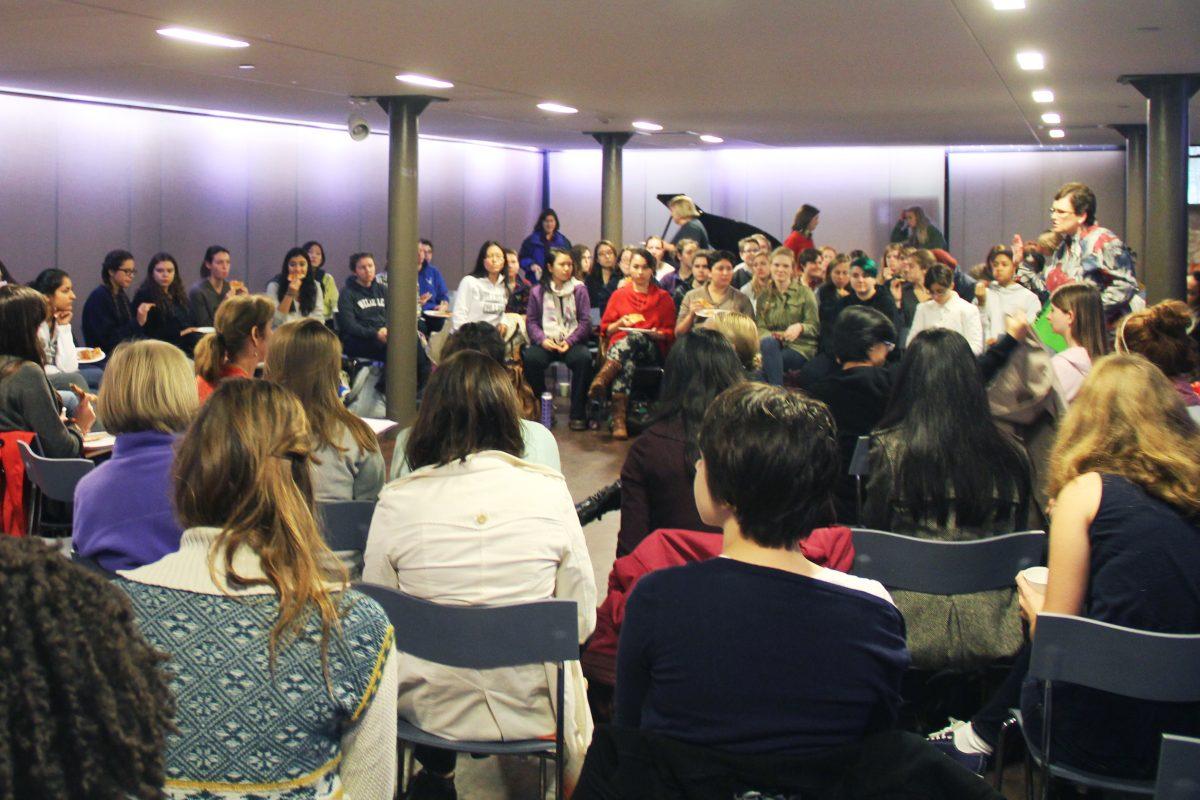The Office of the Dean of Students held an open discussion last Wednesday in the Multifaith Center about the New York Times article published two weeks ago, “When Women Become Men at Wellesley College.” In the article, journalist Ruth Padawer tells the stories of trans students at Wellesley and interviewed students and alumni on their opinions concerning trans issues on campus.
Leah Fygetakis, director of services and programs and advisor for LGBTQ students led the discussion. Students, faculty, staff members and alumni filled the chairs of the Multifaith Center. Faculty and staff members did not participate in the discussion, as Fygetakis stated at the beginning of the event that it was meant to be a student-only discussion.
After welcoming the attendees and stating that students who wished to speak should share their names and preferred pronouns before speaking, Fygetakis began the conversation by asking students for their initial reactions to the New York Times article.
The first students who stood up to participate expressed their dissatisfaction with Padawer’s depiction of the issue of trans students at Wellesley, criticizing many aspects such as the article’s focus on trans men as opposed to trans women.
A student who preferred to remain anonymous explained her opposition to the article’s description of gender at Wellesley.
“I thought [the article] felt a lot like social tourism, like it was looking more at the fact that there was a presence of a particular community on campus and dividing the community’s response to that community as a subsection of the student body,” the student stated.
The discussion shifted as students began to voice their opinions on how Wellesley should address the presence of trans students on campus as well as Wellesley’s current admissions policy for trans students and what it means to be a women’s college. Some participants voiced their belief that it is more important for Wellesley to focus on its admission policy for trans women than to question the presence of trans students currently on campus. Many participants expressed their support toward the admission of trans women at Wellesley, some stated that they believe the college should cater to anyone who is not a cis-man, while others expressed their concern that accepting trans men to historically all-women’s colleges denies their identities as men.
During the discussion, a student asked why trans women are not currently admitted to Wellesley. Fygetakis stated that she did not think that anyone present could respond to the question.
“I don’t know that any of us can speak to that and encapture the reasons behind this policy I know I can’t. I think this is what the president’s advisory committee is all about up to now. Wellesley has been going along and focusing on our mission, but now we need to re-examine everything,” Fygetakis said.
Students also expressed that although many of them believe the article did not accurately depict the issue of trans students on campus, they were glad that it brought people’s attention to the issue and led to discussions about the topic. Some stated that they felt uneducated about the topic and that the article taught them more about trans issues at Wellesley.
“Even though people had issues with the article and the fact that it wasn’t a full representation of gender issues I was glad that it came out because it’s opened this conversation to people who don’t have any experience with it or any knowledge or anyone to learn from,” Tali Marcus ’15 stated after the discussion.
As the discussion progressed, more students stood up to express their desire for Wellesley to continue identifying itself as a women’s college and their reluctance to let go of calling the student body a “sisterhood.” Participants also voiced their concern that Wellesley is not a safe space to talk about gender issues. Participants pointed out that many students on campus do not express their opinions about gender on campus for fear of being criticized. Marcus noted that the fear of being criticized could be seen as students who want to keep describing Wellesley as a women’s college did not stand up to speak until the end of the discussion.
“What I noticed at the beginning of the conversation that I am happy changed as we went on is that people who aren’t as open to Wellesley changing weren’t speaking up as much, and I think that understandably they probably felt uncomfortable disagreeing with the majority,” Marcus said.
Several of the students present were supportive of the steps that the College has taken thus far to explore trans issues at Wellesley.
“I think that [the administration] is doing it in the best way they know how,” Maggie Dalton ’17 said after the discussion. “I think it’s important that everyone is included in the decisions that are being taken, not only those that are speaking up publicly. [Mount] Holyoke did it last year very quietly and Wellesley doesn’t do things quietly, and so I’m not surprised by the way that it’s being handled.”
Similarly, Clare Gil ’17 said that she is glad to see that the article led the administration to support discussion on campus.
“I think it’s good that the administration put together the advisory committee on gender. The article helped prompt a number of discussions, and I hope that that doesn’t die out and that we can continue having these conversations,” Gil said.
The organizers stated at the end of the event that they were happy that such a large number of students showed up and maintained a respectful environment throughout the event while sharing a wide range of opinions. Fygetakis expressed her desire to hear more student opinions and invited students to email her with comments and feedback.
Photo by Bianca Pichumuthu ’16, Photography Editor






